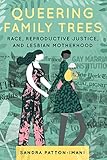Queering Family Trees : Race, Reproductive Justice, and Lesbian Motherhood / Sandra Patton-Imani.
Material type: TextPublisher: New York, NY : New York University Press, [2020]Copyright date: ©2020Description: 1 online resource : 10 black and white illustrationsContent type:
TextPublisher: New York, NY : New York University Press, [2020]Copyright date: ©2020Description: 1 online resource : 10 black and white illustrationsContent type: - 9781479865567
- 9781479866595
- Families -- United States
- Lesbian mothers -- United States
- Race discrimination -- United States
- Reproductive rights -- United States
- SOCIAL SCIENCE / LGBT Studies / Gay Studies
- Adoption
- African American
- Allegories
- Belonging
- Birth
- California
- Child welfare
- Choice
- Citizenship
- Civil Rights Movement
- Coalition
- Colorblind
- Economic stratification
- Education
- Enslavement
- Equality
- Family values
- Fertility
- Future of the nation
- Genealogy
- Hospital care
- Illegal
- Illegitimacy
- Illegitimate
- Immigration
- Intersectionality
- Invalid
- Iowa
- Kinship
- Legibility
- Legitimacy
- Lesbians
- Marriage equality
- Marriage
- Motherhood
- Navajo
- New Mexico
- Orphans
- Power
- Pregnancy
- Proposition 8
- Queerness
- Race
- Racial blame
- Redemption
- Reproductive justice
- Salvation
- Same-sex marriage
- Settler colonialism
- Social institutions
- Socialization
- Socioeconomic status
- Stratified reproduction
- Transracial adoption
- Tribal affiliation
- Two-spirit
- Welfare
- White motherhood
- White supremacy
- gender
- patriarchy
- 306.8743086643 23
- HQ75.53 .P38 2021
- online - DeGruyter
| Item type | Current library | Call number | URL | Status | Notes | Barcode | |
|---|---|---|---|---|---|---|---|
 eBook
eBook
|
Biblioteca "Angelicum" Pont. Univ. S.Tommaso d'Aquino Nuvola online | online - DeGruyter (Browse shelf(Opens below)) | Online access | Not for loan (Accesso limitato) | Accesso per gli utenti autorizzati / Access for authorized users | (dgr)9781479866595 |
Browsing Biblioteca "Angelicum" Pont. Univ. S.Tommaso d'Aquino shelves, Shelving location: Nuvola online Close shelf browser (Hides shelf browser)

|

|

|

|

|

|

|
||
| online - DeGruyter Paranoid Science : The Christian Right's War on Reality / | online - DeGruyter Eight Stories : Tales of War and Loss / | online - DeGruyter Gender Reckonings : New Social Theory and Research / | online - DeGruyter Queering Family Trees : Race, Reproductive Justice, and Lesbian Motherhood / | online - DeGruyter Anti-Fandom : Dislike and Hate in the Digital Age / | online - DeGruyter Heart-Sick : The Politics of Risk, Inequality, and Heart Disease / | online - DeGruyter For Liberty and the Republic : The American Citizen as Soldier, 1775-1861 / |
restricted access online access with authorization star
http://purl.org/coar/access_right/c_16ec
Argues that significant barriers to family-making exist for lesbian mothers of color in the United StatesOne might be tempted, in the afterglow of Obergefell v. Hodges, to believe that the battle has been won, that gays and lesbians fought a tough fight and finally achieved equality in the United States through access to legal marriage. But that narrative tells only one version of a very complex story about family and citizenship.Queering Family Trees explores the lived experience of queer mothers in the United States, drawing on over one hundred interviews with African American, Latina, Native American, white, and Asian American lesbian mothers living in a range of socioeconomic circumstances to show how they have navigated family-making. While the legalization of same-sex marriage and adoption in 2015 has provided avenues toward equality for some couples, structural and economic barriers have meant that others-especially queer women of color who often have fewer financial resources-have not been able to access seemingly available "choices" such as second-parent adoptions, powers of attorney, and wills. Sandra Patton-Imani here argues that the virtual exclusion of lesbians of color from public narratives about LGBTQ families is crucial to maintaining the narrative that legal marriage for same-sex couples provides access to full equality as citizens. Through the lens of reproductive justice, Patton-Imani argues that the federal legalization of same-sex marriage reinforces existing structures of inequality grounded in race, gender, sexuality, and class. Queering Family Trees explores the lives of a critically erased segment of the queer population, demonstrating that the seemingly "color blind" solutions offered by marriage equality do not rectify such inequalities.
Mode of access: Internet via World Wide Web.
In English.
Description based on online resource; title from PDF title page (publisher's Web site, viewed 01. Nov 2023)


